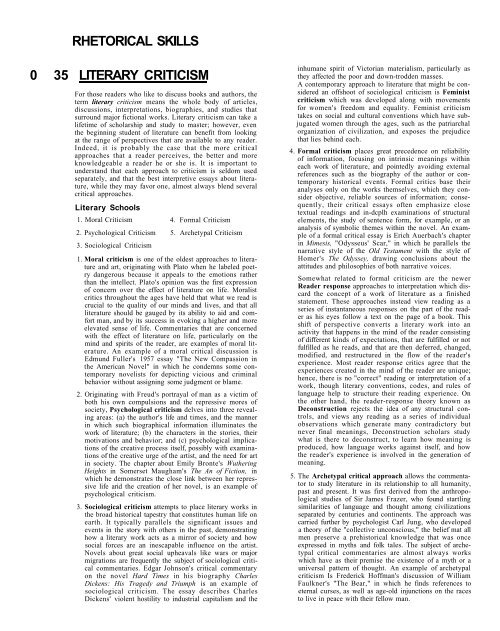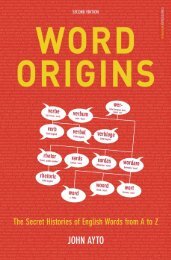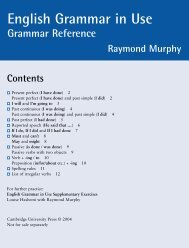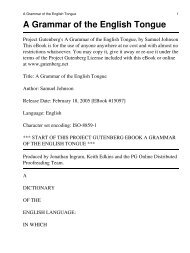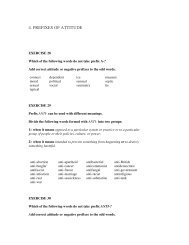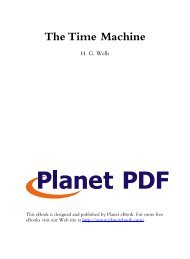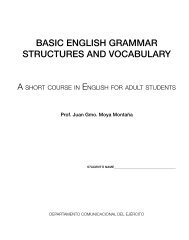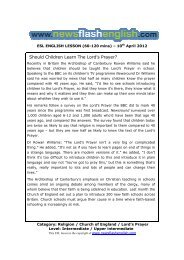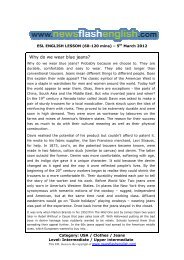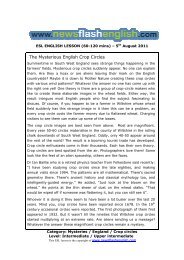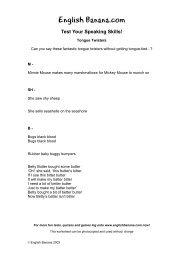TO DOWNLOAD - 75 Pages (928kb - PDF format) - ESL Teachers ...
TO DOWNLOAD - 75 Pages (928kb - PDF format) - ESL Teachers ...
TO DOWNLOAD - 75 Pages (928kb - PDF format) - ESL Teachers ...
You also want an ePaper? Increase the reach of your titles
YUMPU automatically turns print PDFs into web optimized ePapers that Google loves.
RHE<strong>TO</strong>RICAL SKILLS0 35 LITERARY CRITICISMFor those readers who like to discuss books and authors, theterm literary criticism means the whole body of articles,discussions, interpretations, biographies, and studies thatsurround major fictional works. Literary criticism can take alifetime of scholarship and study to master; however, eventhe beginning student of literature can benefit from lookingat the range of perspectives that are available to any reader.Indeed, it is probably the case that the more criticalapproaches that a reader perceives, the better and moreknowledgeable a reader he or she is. It is important tounderstand that each approach to criticism is seldom usedseparately, and that the best interpretive essays about literature,while they may favor one, almost always blend severalcritical approaches.Literary Schools1. Moral Criticism 4. Formal Criticism2. Psychological Criticism 5. Archetypal Criticism3. Sociological Criticism1. Moral criticism is one of the oldest approaches to literatureand art, originating with Plato when he labeled poetrydangerous because it appeals to the emotions ratherthan the intellect. Plato's opinion was the first expressionof concern over the effect of literature on life. Moralistcritics throughout the ages have held that what we read iscrucial to the quality of our minds and lives, and that allliterature should be gauged by its ability to aid and comfortman, and by its success in evoking a higher and moreelevated sense of life. Commentaries that are concernedwith the effect of literature on life, particularly on themind and spirits of the reader, are examples of moral literature.An example of a moral critical discussion isEdmund Fuller's 1957 essay "The New Compassion inthe American Novel" in which he condemns some contemporarynovelists for depicting vicious and criminalbehavior without assigning some judgment or blame.2. Originating with Freud's portrayal of man as a victim ofboth his own compulsions and the repressive mores ofsociety, Psychological criticism delves into three revealingareas: (a) the author's life and times, and the mannerin which such biographical in<strong>format</strong>ion illuminates thework of literature; (b) the characters in the stories, theirmotivations and behavior; and (c) psychological implicationsof the creative process itself, possibly with examinationsof the creative urge of the artist, and the need for artin society. The chapter about Emily Bronte's WutheringHeights in Somerset Maugham's The An of Fiction, inwhich he demonstrates the close link between her repressivelife arid the creation of her novel, is an example ofpsychological criticism.3. Sociological criticism attempts to place literary works inthe broad historical tapestry that constitutes human life onearth. It typically parallels the significant issues andevents in the story with others in the past, demonstratinghow a literary work acts as a mirror of society and howsocial forces are an inescapable influence on the artist.Novels about great social upheavals like wars or majormigrations are frequently the subject of sociological criticalcommentaries. Edgar Johnson's critical commentaryon the novel Hard Times in his biography CharlesDickens: His Tragedy and Triumph is an example ofsociological criticism. The essay describes CharlesDickens' violent hostility to industrial capitalism and theinhumane spirit of Victorian materialism, particularly asthey affected the poor and down-trodden masses.A contemporary approach to literature that might be consideredan offshoot of sociological criticism is Feministcriticism which was developed along with movementsfor women's freedom and equality. Feminist criticismtakes on social and cultural conventions which have subjugatedwomen through the ages, such as the patriarchalorganization of civilization, and exposes the prejudicethat lies behind each.4. Formal criticism places great precedence on reliabilityof in<strong>format</strong>ion, focusing on intrinsic meanings withineach work of literature, and pointedly avoiding externalreferences such as the biography of the author or contemporaryhistorical events. Formal critics base theiranalyses only on the works themselves, which they considerobjective, reliable sources of in<strong>format</strong>ion; consequently,their critical essays often emphasize closetextual readings and in-dcplh examinations of structuralelements, the study of sentence form, for example, or ananalysis of symbolic themes within the novel. An exampleof a formal critical essay is Erich Auerbach's chapterin Mimesis, "Odysseus' Scar," in which he parallels thenarrative style of the Old Testament with the style ofHomer's The Odyssey, drawing conclusions about theattitudes and philosophies of both narrative voices.Somewhat related to formal criticism are the newerReader response approaches to interpretation which discardthe concept of a work of literature as a finishedstatement. These approaches instead view reading as aseries of instantaneous responses on the part of the readeras his eyes follow a text on the page of a book. Thisshift of perspective converts a literary work into anactivity that happens in the mind of the reader consistingof different kinds of expectations, that are fulfilled or notfulfilled as he reads, and that are then deferred, changed,modified, and restructured in the flow of the reader'sexperience. Most reader response critics agree that theexperiences created in the mind of the reader are unique;hence, there is no "correct" reading or interpretation of awork, though literary conventions, codes, and rules oflanguage help to structure their reading experience. Onthe other hand, the reader-response theory known asDeconstruction rejects the idea of any structural controls,and views any reading as a series of individualobservations which generate many contradictory butnever final meanings, Deconstruction scholars studywhat is there to deconstruct, to learn how meaning isproduced, how language works against itself, and howthe reader's experience is involved in the generation ofmeaning.5. The Archetypal critical approach allows the commentatorto study literature in its relationship to all humanity,past and present. It was first derived from the anthropologicalstudies of Sir James Frazer, who found startlingsimilarities of language and thought among civilizationsseparated by centuries and continents. The approach wascarried further by psychologist Carl Jung, who developeda theory of the "collective unconscious," the belief mat allmen preserve a prehistorical knowledge that was onceexpressed in myths and folk tales. The subject of archetypalcritical commentaries are almost always workswhich have as their premise the existence of a myth or auniversal pattern of thought. An example of archetypalcriticism Is Frederick Hoffman's discussion of WilliamFaulkner's "The Bear," in which he finds references toeternal curses, as well as age-old injunctions on the racesto live in peace with their fellow man.


